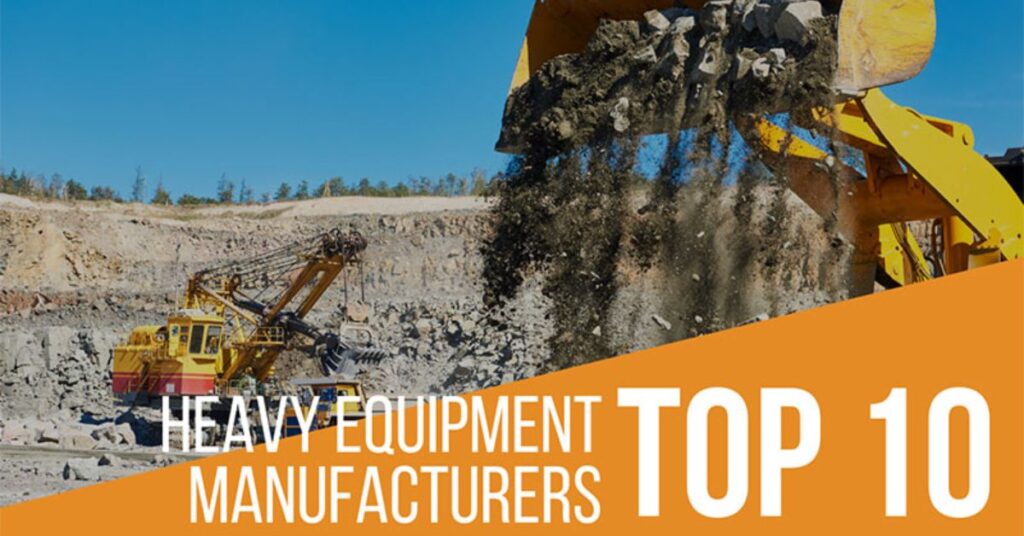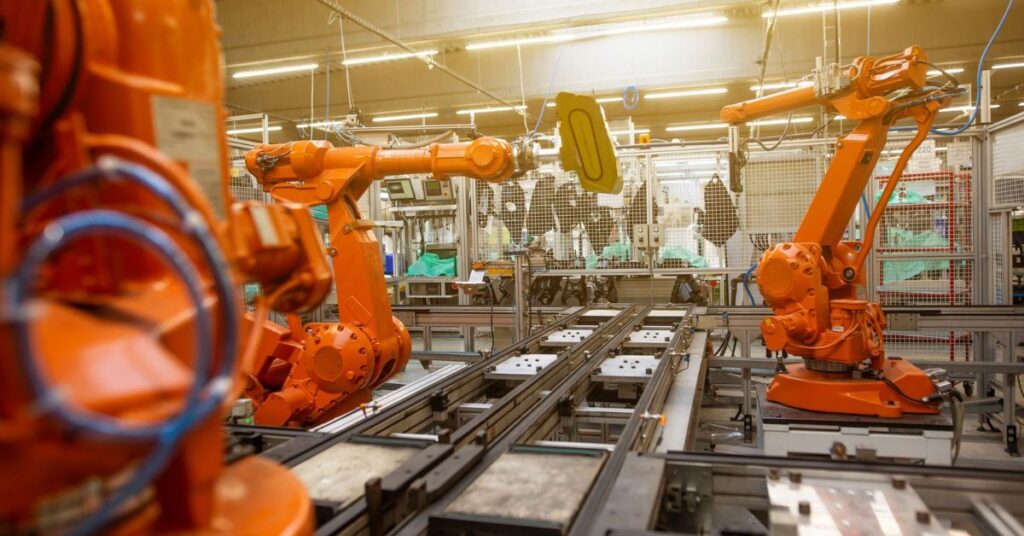
Modern manufacturing depends heavily on heavy machinery for both factories plus equipment. The processing industry depends on this equipment to execute tasks which manual employees cannot manage. Heavy machinery operates factories through its capacity to handle materials and assemble products thus enabling efficient operation.
These equipment systems both raise manufacturing efficiency levels and lower production expenses along with guaranteeing production precision.The global manufacturing market relies heavily on advanced machinery for manufacturers to succeed in their industries. During current times of accelerating technological development heavy equipment evolves through the incorporation of automated systems combined with robotic solutions and intelligent monitoring systems. Improved manufacturing processes enable factories to operate more efficiently and complete production of high-quality products for increased demand.
The Importance of Heavy Machinery in Manufacturing
Specialized production equipment serves factories when they perform their multiple operation tasks effectively. The absence of heavy machinery for manufacturing purposes would lead factories to experience delayed and irregular output in addition to heightened production costs. Industrial machines allow factories to control precision during manufacturing while improving their production speed.
Machinery power production levels in automotive manufacturing together with construction operations and electronics manufacture and food production services. Manufacturing operations through industrial machinery decreased people’s reliance on manual work while enhancing workplace both safety and productivity.
Types of Heavy Machinery for Factories & Equipment
The requirements of factories determine the selection of various heavy machinery which they need. The machines execute critical duties to maintain effective production together with quality assurance operations.
Material Handling Equipment
Producing materials requires fundamental material handling operations. The production facilities use machines such as forklifts together with cranes and conveyor belts to transport materials. The machines serve two purposes because they push materials from storage to production sites and then carry finalized products to storage areas and shipping destinations.
Forklifts act as essential equipment which enables warehouse operators to move their heavy cargo throughout production areas and storage facilities. The modern industry relies on cranes to lift materials for positioning during metal fabricating or large manufacturing operations. Modern production benefits from conveyor belts because they move products between various processing stages thus both lowering labor requirements and enhancing operational speed.
Production Machinery

Industries focusing on manufacturing employ industrial equipment to conduct product shaping operations as well as cutting actions and assembly stages. CNC (Computer Numerical Control) equipment serves as a main technology for producing exact metal and plastic component forms. The production machines execute predetermined instructions that lead to uniform and exact output.
Plastic part manufacturing happens through machines which perform the process of injecting hot materials into mold cavities. The industry benefits from these machines when producing plastic goods, automotive parts and consumer electronics. The precision capabilities of laser cutting machines make them highly beneficial for metal fabrication through their high-energy beam cutting technology.
Packaging Machinery
The distribution process requires effective packaging of manufactured products following their creation. Packaging machinery operates through automated functions for product sealing while performing labeling operations as well as finishing products with wrapping. The machines boost packaging rate performance at the same time they deliver uniform outcomes.
The food processing sector together with pharmaceuticals and consumer goods industries depend on automated packaging technologies for their operations. Additive packaging equipment generates less waste material and improves product arrangement while making sure products stay safe throughout delivery routes.
Major Global Heavy Machinery Production Companies

Heavy machinery which drives worldwide industrial operations emerges from the ten premier industrial equipment manufacturers on the planet. Industrial machinery for manufacturing that Caterpillar together with JCB and Komatsu produce achieve recognition as high-quality products.
The multinational organization Caterpillar leads the world market for heavy machinery which includes equipment used for construction mining and industrial purposes. JCB stands famous for pushing its backhoe loader and excavator products that serve different industrial market segments. Through its product line Komatsu provides factory and industrial facilities with bulldozers and hydraulic excavators.
Hitachi together with Volvo and Liebherr comprise the list of notable manufacturing companies that create efficient equipment for industrial processes and construction operations. The companies maintain their innovative efforts through the incorporation of automation with smart technology along with enhanced fuel efficiency features in their machine designs.
Technological Advancements in Heavy Machinery for Factories & Equipment
Modern technology in manufacturing transforms industrial devices into more effective as well as intelligent instruments. Modern production processes became quicker and more precise because of automation and artificial intelligence implementation. Production facilities implement intelligent machines that integrate monitoring systems with sensors to improve operational performance.
A significant technological breakthrough involves the creation of machines that operate independently. The machines function autonomously to cut down human labor expenses and create safer production environments. Robotics significantly improved manufacturing processes since machines carry out complex work such as welding activities and assembly processes while performing high-accuracy quality control functions.
Heavy machine technologies now receive power from electrical systems as a significant recent advancement. Manufacturers have started creating electric machines which cut down carbon emissions together with energy usage. Industrial operations oriented towards environmental sustainability adopt these changes as part of worldwide initiatives for creating environmentally friendly industrial production methods.
Challenges Facing the Heavy Machinery Industry

The heavy machinery industry maintains critical status yet it deals with various obstacles. The high expense of machinery represents a substantial obstacle for this industry sector. Significant financial expenditures along with costs related to maintaining heavy equipment prove to be major obstacles for small and medium-sized businesses entering this market segment.
Heavy industries encounter problems because of supply chain interruptions. Production delays can occur because many producers get their components from international suppliers through supply chain networks. Advanced electronics in machinery systems have become a point of concern for industries affected by the current global semiconductor shortage.
The shortage of skilled labor forces organizations to encounter substantial difficulties. Companies experience delays in industrial operations due to a shortage of employees who have the required expertise to operate and maintain heavy machinery. Modern companies dedicate funds to train their employees because they need the know-how to operate modern equipment.
The Future of Heavy Machinery for Factories & Equipment
Heavy machinery maintains a positive outlook because manufacturing operations actively integrate digital innovations into their operations. Intelligent manufacturing facilities using Industry 4.0 technologies will step up their adoption of automated and interconnected industrial machines. The machines will establish connections to optimize operations by refining production systems while saving time through predictive equipment maintenance.
3D printing becomes a revolutionary technology which transforms the way the industry operates. Modern factories use demand-driven production of machine components to cut down their dependence on traditional distribution systems. Production repairs will become faster while operational costs decrease.
Heavy machinery will evolve under the influence of environmental sustainability standards. Modern manufacturers create environmental-friendly equipment which minimizes both emissions together with energy usage. The implementation of green technology will result in the development of electric and hybrid-powered industrial machinery which will establish sustainable operations.
Conclusion
Production-based companies need essential heavy machinery and equipment to achieve their manufacturing goals. The machines increase operational output while providing safer work environments and maintaining dependable product quality standards. Technological progress leads factories to operate with more intelligence as well as increased efficiency and reduced environmental impact. The industry expansion will happen through innovation adoption while answering rising market requirements.
FAQs
What does heavy machinery for factories & equipment entail?
Heavy machinery involves industrial tools utilized for processes like material handling, assembly, and packing in a factory.
Which industries make use of heavy machinery?
Food and beverage, electronics, automotive, construction, and others rely heavily on these machines for effective output.
Who are the leading producers of heavy machinery?
The world’s leading producers of heavy machinery are115 Volvo, Hitachi, Komatsu, JCB and Caterpillar.
What are the new changes in the industrial machinery tools?
The introduction of automations, use of electric powered tools and Artificial intelligence, and use of robotics has changed the face of the heavy machinery industry.
In which ways does heavy machinery affect the efficiency of manufacturing?
The use of heavy machinery increases the efficiency of operating tasks by minimizing labor, speeding up output, increasing accuracy, and providing better safety in the workplace.
